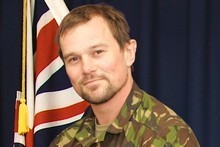 Image via Wikipedia
Image via Wikipedia
A
New Zealand SAS soldier who was shot dead in Afghanistan yesterday
may have been caught up in family feud, it has been alleged.
Lance Corporal Leon Smith was shot in the head during an operation in
Wardak province, southwest of Kabul, at a compound suspected of housing
Taleban bomb-makers preparing for an attack in the capital.
An Afghan
Crisis Response Unit of about 50 men went to the compound with an Interior Ministry arrest warrant.
They were accompanied by legal officers and about 15 of the 38
SAS troops in Afghanistan.
At 1.30 pm, when Prime Minister John Key, Defence Minister Wayne Mapp
and Defence chief Lieutenant General Rhys Jones announced Lance Corporal
Smith's death - without naming him - the operation was continuing. It
ended later in the afternoon
.
General Jones said he had reports that two civilians, a child and a man, had been injured.
He said insurgents shot Lance Corporal Smith as coalition forces set up a cordon around the compound.
He was flown to a medical base about 10 minutes away where a neurosurgeon was available, but died on the operating table.
However Dutch investigative journalist, Bette Dam, told Radio New
Zealand Afghan authorities had told her the soldiers may have been
caught up in a family feud.
She said she was told the SAS and the Afghan allies were incorrectly
told by one family that the home was occupied by Taleban bomb-makers.
The governor of Warduk told her the Afghan man who was killed, Younus Khan, was innocent, as were nine others who were injured.
"The governor's office told me that the people actually in the house that got raided were unarmed," she said.
"A lot of things are not clear yet, but for me, from he governor's
office and even from the head of the response unit, there seems to be a
different situation than you expect, like a Taleban being in the house,
trying to Kabul, here at a hotel or whatsever - that seems not the
case."
She understood the bullet that killed Lance Corporal Smith "came from in or around" that house.
Ms Dam said it was a possibility the victims were related to the
government in some way and the governor's office were attempting to
cover this up.
Late last night, Defence Force officials refused to give any other details about
Corporal Smith.
Aged in his early 30s, Lance Corporal Smith is the fourth New Zealand soldier to die in just over a year.
The Defence Force and the Government still describe the SAS troops'
role as "mentoring" the Afghan Crisis Response Unit (CRU), despite two
New Zealand deaths in two months.
Last month, Corporal Douglas Grant died after he was shot through a gap
in his armoured vest during a Taleban raid in the capital, Kabul.
Prime Minister John Key said Lance Corporal Smith had "paid the highest
price for his service to this country and we will mourn his death".
"His death, however, does not alter our commitment to helping
Afghanistan. It continues to be the Government's intention to keep the
SAS in Afghanistan until March as planned."
The PM said he deeply regretted Lance Corporal Smith's death, "but I
don't regret the decision that we made to commit the SAS to
Afghanistan".
"I think they are playing their critical part to free the world from global terrorism."
The SAS is on its fourth deployment to Afghanistan since the US-led invasion in 2001.
A foreign policy analyst at the University of Auckland says the SAS soldiers appear to have moved from their mentoring role.
Associate Professor Stephen Hoadley said two deaths in two months showed the unit was involved in frontline combat.
"The two deaths is certainly an indication that the SAS is no longer leading from behind, but is now leading from in front."
Professor Hoadley said there was a "slight disjunction" between what
the public was being told and what the SAS was doing in Afghanistan.
"It appears that the SAS is doing a bit more than mentoring and
training - and that may lead some to question whether the Government is
telling the whole story."
Earlier, General Jones said the operations involving the SAS were led by the CRU, but the New Zealanders could be drawn on.
"Their primary role, though, is to train and assist in the
decision-making and the execution that the Afghanis do in conducting
that operation.
"To provide the level of advice and support and reassurance that the
Afghans need, our people need to be quite close to the operation."
The death forced a change in Mr Key's plans. He cancelled arrangements
to host Georgian Prime Minister Nikoloz Gilauri at his country's World
Cup match against Romania last night in Palmerston North.
Mr Key said he would still have dinner with Mr Gilauri, but "I think it would be insensitive for me to go to the game"
The second death of a NZ SAS trooper in Afghanistan in just over a month, is beginning to create some opposition in New Zealand just a couple of months out from the general elections in November. The NZ Government plans to withdraw remaining SAS soldiers from Afghanistan in March, 2012, next year. They will not be replaced.
http://news.msn.co.nz/video.aspx?videoid=0ede9481-c880-4036-97e7-040e8e7987f7
http://blogging-along-with-pete.wallinside.com
 Image by Getty Images via @daylife
Image by Getty Images via @daylife Image by Getty Images via @daylife
Image by Getty Images via @daylife Image via Wikipedia
Image via Wikipedia

 Image via Wikipedia
Image via Wikipedia

 Image via Wikipedia
Image via Wikipedia